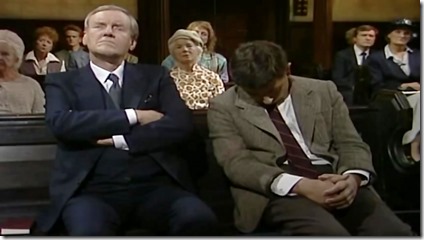 “These people just don’t value the Word!”
“These people just don’t value the Word!”
The previous Sunday he had given a 50 minute exposition on an obscure text in 1 Kings. It was accurate, scholarly, and the point of his sermon was indeed the point of the text. It was, as we Reformed-ish people like to say, “solid”.
It also fell flat.
Sure, he got several of those typical “good sermon preacher” messages in the foyer after church. But he saw the glazed over look on their face. And some of the comments afterwards weren’t as encouraging.
“I had a hard time following that one.”
“That was deep stuff. Over my head!”
How, then, does he assess this? He was faithful to the text, God’s Word doesn’t come back void, and yet the people didn’t seem to value the Word enough to dig deeper. They weren’t willing to go into the depths, where the pastor was.
Maybe they just don’t value the Word…
—-
“These people just don’t care about the Word of God anymore.”
The pastor had been at this particular church for almost a decade. When he first started the people were engaged and eating up his Bible studies. They were hungry for the Word, and he was happy to feed them.
But somewhere around year three, they didn’t seem to be nearly as engaged. He was preaching about the same message he had been preaching at the beginning. Simple and engaging talks that came out of the Bible. They were relevant and preached at a level that new believers would easily follow along.
But now people seemed bored. They weren’t getting fed anymore, it seemed. If you asked the people in the congregation they’d tell you that every message seemed about the same. They were helpful when he first came, but one can only remain engaged in the same message for so long.
What’s the pastor to conclude, then? Have they gotten “bored with the gospel”? Do they not value the Word anymore?
—
With many such parables he spoke the word to them, as they were able to hear it. –Mark 4:33
That little phrase at the end has massive implications for preachers. It also helps to solve the conundrum of both the pastors mentioned above.
Mark 4 is all about the importance of hearing and responding to the message of Jesus. It’s filled with parables that serve as little windows into the kingdom of God. But these parables also serve as an invitation into discipleship. Will it catch their attention? Will they follow the parable into its deeper meaning?
Jesus not only met people where they were, he also stayed a step or two ahead of them. And that is what is missing for the pastors in the above scenarios. For the one pastor he is so far ahead of his congregation that they don’t even know how to get to him. He’s not even speaking the same language. For the other pastor he’s not taking them anywhere. He’s got them, he’s fed them, but now he needs to lead them into greener pastures.
Parables are little stories that engage and reach someone where they are. And they also conceal a deeper meaning which invites the hearer into discipleship and further questions.
We would do well to follow Jesus in this. We don’t overwhelm with information and dump everything we know. But we also give enough to invite our hearers into receiving more. When they have a glazed over look we don’t assume they don’t value the Word—we assume we went a bit too far into the weeds. And when they seem bored, we don’t assume that the gospel doesn’t cut it for them—we assume that we’re not giving them next steps of discipleship.
It’s really a beautiful thing that Jesus is doing here. It shows us how dynamic faith actually is. It’s not stale and static. It’s more like a dance than a scientific exam. I appreciate these words of Ronald Kernaghan:
Faith for Mark is more like an adventure whose terms unfold as we pursue it. It cannot be understood from a distance, and we are never in control of what happens. Our part is to listen and act, and then listen and act again and again. That alone is an unnerving thought for people living in a postmodern world. In our thoughts and dreams the self is invariably at the center of things, but in this adventure the self has been dislodged. There is something or someone else at the center of things whom we can neither define nor control. We are invited to follow along when we have only an inkling of where we are going. (Kernaghan, 100)
We pastors do well to learn this dance.